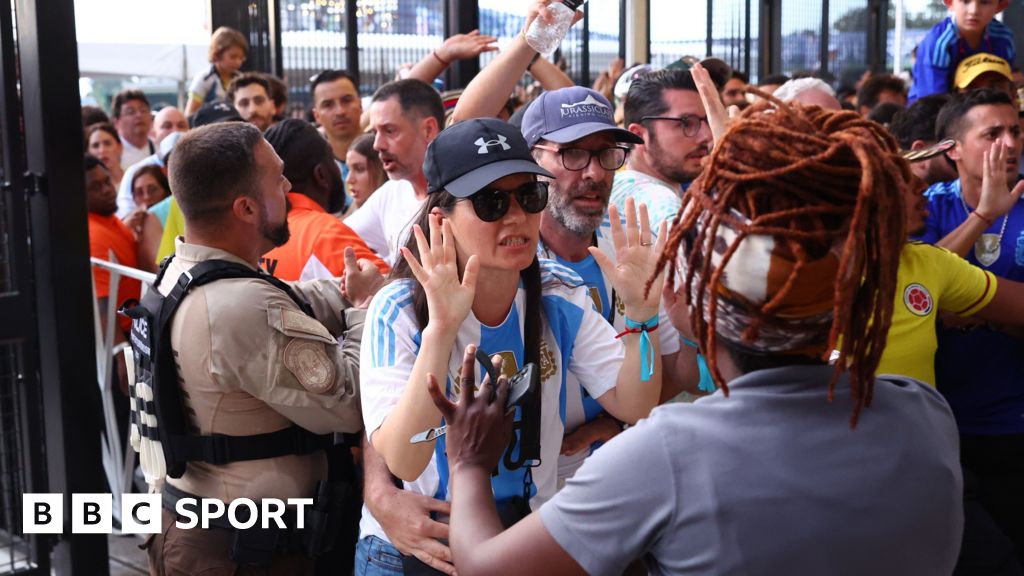- Author, Ben Collins
- Role, BBC Sport journalist
The 2024 Copa America was supposed to showcase the Americas’ passion for football.
But, as Argentine newspaper Ole put it, “this party almost became a tragedy”.
Hosted by the United States, in some of the biggest and best stadiums in world sport, the tournament was beset by problems.
It featured poor pitches, half-empty stadiums and crowd trouble before ending in chaotic scenes on Sunday.
Several arrests were made after clashes with police and security personnel, while several supporters needed treatment from paramedics.
It was far from the showpiece the organisers hoped for and raises concerns before the 2026 World Cup, set to be co-hosted by the US, Canada and Mexico.
So what went wrong and what can be learned from an event Argentine media outlet Todo Noticias branded a “world-class failure”?
‘A plague of liars’
Problems were apparent in the opening game between Argentina and Canada. Argentina coach Lionel Scaloni and players from both teams complained about the condition of the pitch in Atlanta.
Eleven of the 14 host venues were NFL stadiums and six of them had grass pitches installed over an artificial surface. In some cases, the turf was laid just days before.
The tournament is organised by Conmebol, South American football’s governing body, which said it carried out tests before and after games that showed pitches were in good condition.
But Uruguay coach Marcelo Bielsa said in a news conference that they were “a plague of liars”, that the training pitches provided “were a disaster”, and that Scaloni and his players had been “threatened” not to speak out.
Brazil’s Real Madrid forward Vinicius Jr criticised both the standard of the pitches and refereeing, while the Football Federation of Chile (FFC) asked for referee Wilmar Roldan to be sanctioned for “disastrous conduct” during their final group game.
Uruguay players then clashed with Colombia fans after their semi-final defeat, having gone into the stands to protect their families.
The Uruguay Football Association (AUF) said there were insufficient security measures in place at the game in Charlotte, where Colombian and Uruguayan fans were not segregated.
Most of the games in the knockout stages were sold out, but crowds were significantly below capacity at 50% of the 32 games across the tournament.
That was partly because of ticket prices. The average cost was estimated to be about $200 (£155), although tickets for certain games were far more expensive on US resale sites and because of dynamic ticket pricing.
What happened at the Copa America final?
Before Sunday’s final, Colombia coach Nestor Lorenzo had already complained about Colombian popstar Shakira performing a half-time show, meaning the interval would last for 25 minutes rather than 15.
Conmebol also issued a statement saying that only ticket holders would be allowed to enter the stadium campus before the 20:00 kick-off (local time).
But as the scheduled kick-off time approached, a statement from a stadium spokesperson said that thousands of ticketless fans had “attempted to forcibly enter the stadium”, which has a capacity of 65,000.
Footage shows fans breaching the stadium gates, climbing over perimeter walls and fencing, and even through ventilation ducts.
A stadium statement later explained that as gates were “closed and re-opened strategically”, some fans “continued to engage in illegal conduct – fighting police officers, breaking down walls and barricades and vandalising the stadium, causing significant damage to the property”.
It had become overcrowded outside the stadium, with fans waiting in 31C heat, and a joint decision was made – for a short period – to allow fans in without scanning tickets “to prevent stampedes and serious injury at the perimeter”.
“The gates were then closed once the threat of fans being crushed was alleviated,” the statement added. “At that time, the venue was at capacity and gates were not re-opened.”
Players’ families were also involved in the chaos, and Argentina coach Scaloni said afterwards: “We had to start a match without knowing where our family members were. It was very weird.”
The game ultimately kicked off more than an hour late. With there being extra time as well as the half-time show, it did not finish until 00:09 local time.
Image source, Getty Images
Stadium ‘disappointed’ ticket holders left outside
Eight of the Copa America venues will also be used for the 2026 World Cup. They include the Hard Rock Stadium, which is set to host seven matches including a quarter-final and the third-place play-off.
A stadium statement said that the venue will work with law enforcement to identify those responsible for Sunday’s disorder and review the processes in place “to ensure such an event never happens again”.
It added that the number of law enforcement officers and security personnel on site was more than double that for regular sellout events.
“We understand there are disappointed ticket holders who were not able to enter the stadium after the perimeter was closed, and we will work in partnership with Conmebol to address those individual concerns,” the statement read.
“Ultimately, there is nothing more important than the health and safety of all guests and staff, and that will always remain our priority.”
While Conmebol is responsible for the Copa America, the World Cup is organised by the world governing body Fifa, so the North America-based Independent Supporters Council (ISC) is “confident” the 2026 tournament will welcome fans “safely and adequately”.
A statement added: “While Copa America highlighted serious issues that could occur and make people apprehensive about making the journey to North America, we trust that the host cities and planning committees have taken note of those issues and are already anticipating and planning accordingly.
Conmebol and Fifa have been approached for comment.

